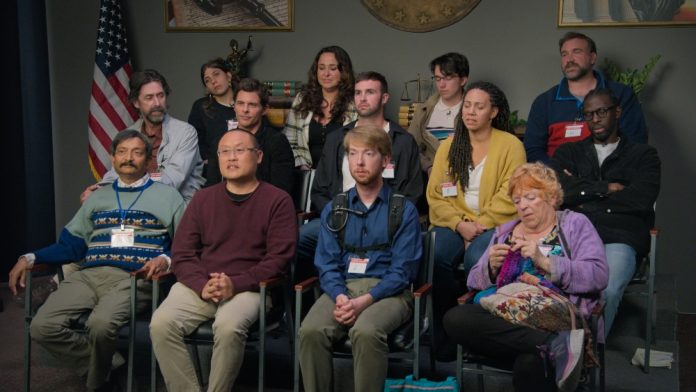Jury Duty executive producer Nicholas Hatton is a master of manipulation, or at least he was when it came to creating, designing, and executing one of the most elaborate ruses seen in TV history. Hatton was nominated for an Emmy for Outstanding Comedy Series for his efforts in fooling would-be juror Ronald Gladden, a solar panel contractor who is completely clueless to the fact that he’s part of a fake trial.
Gladden answered an ad on Craigslist for what he believed was a documentary being filmed about the legal system, and he participated in Jury Duty both wholeheartedly and blissfully unaware of its intention. Even when a celebrity like James Marsden reported for jury duty alongside Gladden, he never questioned the validity of the project.
The seven-episode Freevee series premiered in April and it plays like a cross between the original UK version of The Office and the hidden camera show Punk’d. The comedy came out of nowhere and is now up for a handful of Emmys, including Supporting Actor (Marsden), Casting (Susie Farris), and Writing (Mekki Leeper) for a comedy series.
Hatton began his career in the UK as a producer on films such as Les Miserables, Tinker Tailor Soldier Spy, and Baby Driver before shocking America with Sacha Baron Cohen‘s Showtime series Who Is America? and Borat Subsequent Moviefilm.
Above the Line recently spoke with Nicholas Hatton via Zoom video from Los Angeles, where he revealed that he was inspired by The Office and said he paid homage to the beloved UK series by employing a similar style and tone in Jury Duty. Hatton also talked about casting the lovable and unsuspecting Gladden, who Hatton saw as the hero of the story, and about getting permission to poke fun at Marsden’s movie star persona. Hatton also discussed how he did his best to keep the talented cast on their toes in case Gladden grew suspicious and developed an inkling that something was awry.
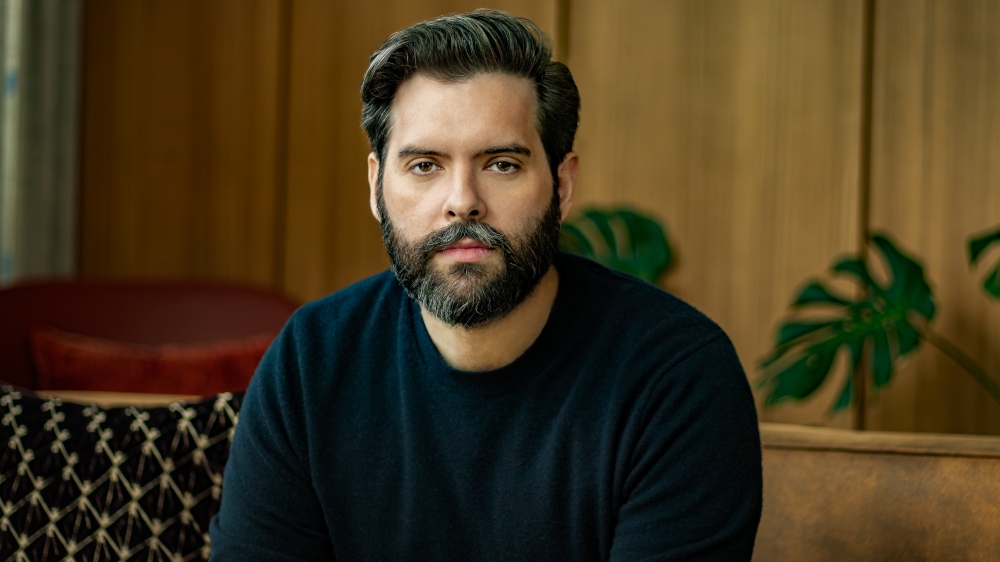
Above the Line: So nice to meet you. What a show! So take me back to the very beginning. What was the germ of the idea behind this project? How’d it all start?
Nicholas Hatton: Yeah, absolutely. And thank you for watching. So between two of my colleagues, Todd Schulman and David Bernad, there was a text exchange along the lines of, “What if Jim from The Office was a real guy and everyone around him was still an actor?” Then, on top of that, what if we gave Jim a storyline, like a hero’s journey, like, I don’t know, 12 Angry Men? And could you get that real person to the deliberation in the final episode? And someone like Henry Fonda would stand up there in a room full of people who just want to go home and say, “No, we have to stay here and do what’s right and what’s correct.” That was the germ of the idea.
They knew [Jury Duty creators] Lee Eisenberg and Gene Stupnitsky, very well-known writers and producers of The Office, and from there they sort of baked this idea. Once the idea was baked and they sold it to Freevee, Todd, who I’d worked with previously, finished making Borat 2, and Todd said, ‘So, we have this idea. We don’t know how to make it. Can you do it?” At that point, it was like, “This is a great idea. Thank you very much.” I now have to figure out how to build this world, how to deliver it, and then execute the whole thing.
ATL: Just to be clear, you’re talking about the original The Office from the UK, right? It’s interesting that you mention The Office because that show popped into my head immediately when I was watching Jury Duty. Was that also in your mind, from a visual perspective?
Hatton: Yeah, very much so. I mean, we use the language of mockumentaries, which started [a while ago], even when you think back to Best In Show. Even the visual language that you see with the talking heads and all that kind of stuff is a visual language that goes back even to Christopher Guest and Rob Reiner and Spinal Tap. Growing up, Best in Show was one of my favorite movies of all time. I think it’s an absolute dream. So we wanted to lean into that feel so it felt familiar and that an audience could just sit in it and really enjoy it and understand the familiarity of it.
Then there was this twist on it, which would be the novel thing that would spark interest and hopefully bring out all these different feelings in folks as they were watching it. So it is very deliberate in the way that it has echoes of The Office and other great mockumentary-style shows, I think, not just visually, but tonally as well.
ATL: You certainly ticked all the right boxes. Were you surprised at the response?
Hatton: The response to the show has been positive because we were somewhat successful in doing all that. The feeling that you’re going to tune into something because you’re going to feel good about it, you’re going to laugh, and at the end of it, you’re going to feel happy having experienced the thing, is almost a kind of comfort watching in a way as well, I think. We wanted folks to tune into this show, feel great about having watched it, and laugh along the way. That’s what we set out to do.
ATL: Tell me about the casting of Ronald Gladden. What was the breakdown like? What were you looking for in your protagonist, so to speak?
Hatton: That’s a good question. So, in terms of what he saw [about the show], not a great deal. He saw a Craigslist ad, which was essentially asking for volunteers/candidates/anyone who was interested in potentially participating in the jury trial. Now, we couldn’t guarantee that you would end up being a juror because we can’t influence the law like that. It’s up to the lawyers to pick the panelists. But we could guarantee that he would be part of the jury pool itself, as long as he was eligible. So he had to be a U.S. citizen of a certain age. And most importantly, could never have done jury duty before, because anyone who’s done jury duty for more than five minutes would’ve stepped into our courtroom, seen some of our procedures, and gone, “You people are crazy. This isn’t how this works at all!” So those were sort of the requirements heading in.
In terms of what we were looking for, what you see is kind of what we were looking for. We were looking for a big-hearted, kind, generous, patient person [who] folks could root for and really emotionally invest in because we knew that we were taking him on a journey unwittingly, that there was an element of deception at play here, and that we were not being completely truthful in our intentions as producers. So we had to find someone who an audience could really get behind, want to see through to the end, and hope for the best for that person. Ronald had all of those qualities and more, and he really brought this person, who was on paper for us, to life in a way that we couldn’t possibly have imagined.
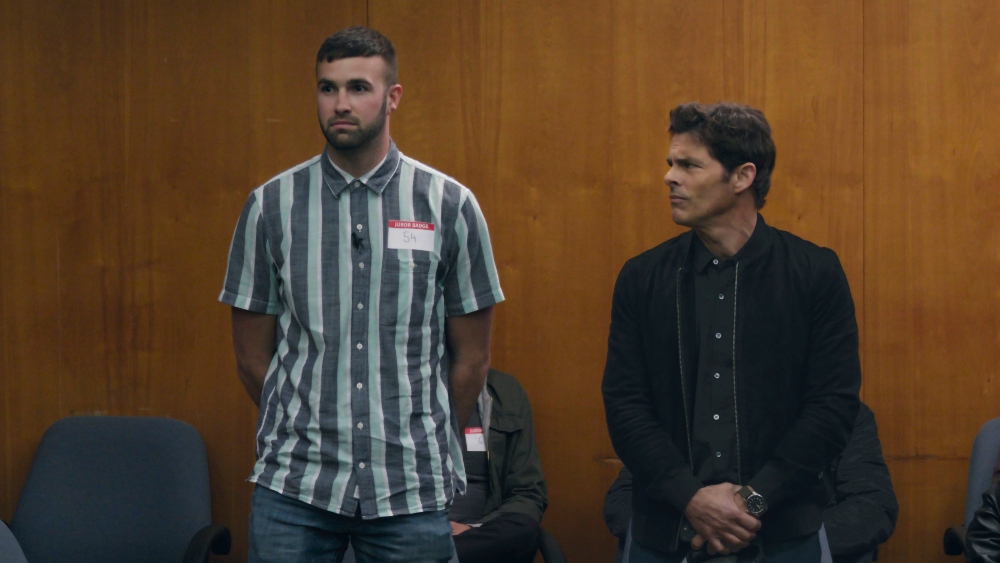
ATL: No pun intended, but as you say, the proof is in the pudding.
Hatton: It feels like America and half of the known world have fallen in love with Ronald Gladden, and that’s entirely his own doing.
ATL: I certainly did. So were there moments when you felt the ruse was going to go awry, and how did you save it?
Hatton: There were several moments with the character of Todd, played brilliantly by David Brown. He’s a bit of an eccentric; he’s an inventor in his own mind. One day, he brought in some chair pants, which he brought to court, and then went through the security device before going into court. That all felt quite heightened and quite silly in the moment.
Ronald did make a comment under his breath to the character Noah, who’s played by Mekki Leeper, who’s also one of our writers. He said, ‘This is like a reality show, man.’ You have to keep in mind that we’re all in the control room, which is about 20 yards away behind a door that can never be opened during the day, and we all have our headsets on, and we’re watching, through this bank of monitors, everything that’s happening. And when he said that, I think at that moment I might have dropped to the floor and hidden under the table for a second.
ATL: How did you fix the snafu?
Hatton: Truthfully, we didn’t have to do much. He just let it kind of ride out. Our other cast was so good at understanding the weirdness you should lean into and the things you should reject. So, for example, if something very strange truly did happen in front of them, it would be more bizarre if he turned to, let’s say, Jeannie, played by Edy Modica, and said, “That was a weird thing.” If she said, “No, no, no, that’s completely normal. That’s very fine,” that would be a very strange reaction. So, they had to really fine-tune their reactions to Ronald to make it feel like they were in this with him rather than him being the center of attention, which is the thing we constantly tried to avoid, even in our camera work.
ATL: Describe the camera work as it pertained to Ronald, as I assume most of the cameras were hidden.
Hatton: Whenever we had cameras on Ronald — because he is our hero and the star of our show — we had to sort of hide it and blend that coverage in so it didn’t feel like he was special in any way.
ATL: Did the scripts change to accommodate Ronald’s reactions?
Hatton: Funnily enough, most of what you see on the show really lines up with the shooting scripts that we had as we began this thing. Shockingly, like, big turns in terms of the soaking in the hotel room (where Noah explains to James Marsden and Ronald about a sex thing called soaking), or “I’m not racist” in the first episode (where Noah is trying to get out of jury duty), or going to Margaritaville (a restaurant in Hollywood) and the arm wrestling, how the deliberation turns out — those things were all written on paper before we started.
Really, it was the skill of the cast and all the crew in terms of us creating these sort of very loose rails, a sort of railing system to guide Ronald through this experience so that even if he was kind of going one way slightly, they would nudge him back in a different direction. So, truthfully, it never really pivoted in a way that we were like, “Oh my gosh, this has completely changed the outlook of the entire show.” We stayed on point, for the most part.
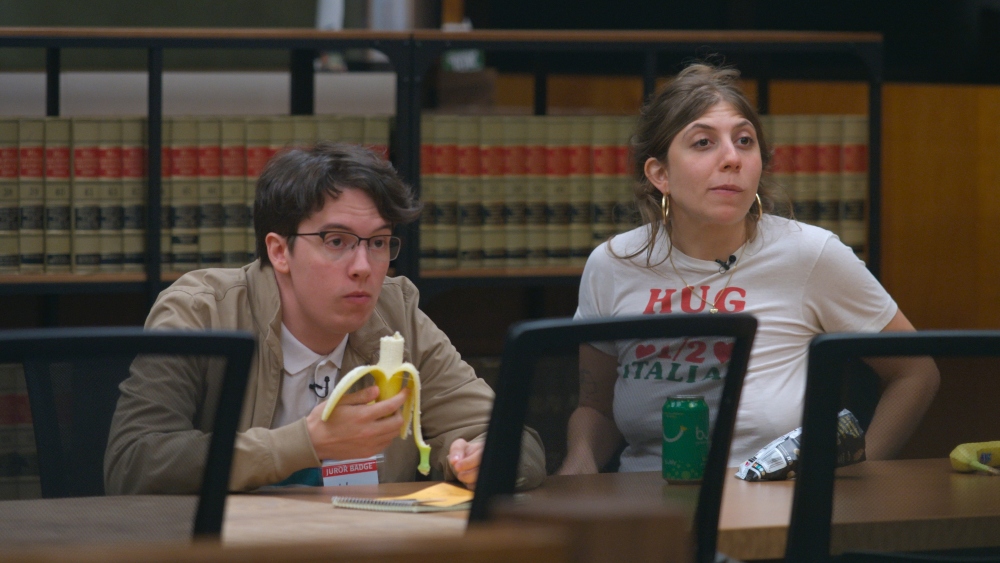
ATL: There must have been one thing you had to change, no?
Hatton: There were a couple of things that we had to change. The character of Ken, who is the gambling addict played brilliantly by Ron Song, was meant to disappear after Episode 6 because of his gambling debts. He was meant to completely leave. He would be in contempt of court, and there would be police chasing after him. We decided not to do that because Ronald had developed such an affection for him and also felt so terrible that he had won $2,000 off of Ken for a game that he didn’t even understand the rules of. So, seeing that reaction from Ronald and seeing his energy again, we never wanted to bully this guy, punch him in the face, or make him feel bad. That was a tweak that we made as the show was going. But shockingly, it kind of went, for the most part, the way that we hoped.
ATL: In terms of the editing process, were there many scenes where the lawyers say, “Objection!” I don’t recall seeing many…
Hatton: Oh my gosh, so, that happened a lot, you just don’t see it in the final version because the loose structure of each episode is, essentially, the case progressing [through] little, interpersonal relationships, and then [there’s] some sort of quest that the group as a whole has outside of the courtroom. So, [in] each episode, you’d see maybe eight or nine minutes worth of court work. In reality, we were in that courtroom for five to six hours every day, and there wasn’t silence in there.
It was legal procedures; it was documentation. It was back and forth between the counsels and the judge, and we knew the only way we could possibly pull this off was if our judge (Alan Barinholtz) and our two lawyers (Trisha LaFache and Evan Williams) were lawyers in real life who just happened to be either actors or writers, because we knew that we were going to count on them to vamp in legalese for potentially 45 minutes at a time without taking a breath, essentially. There were plenty of “objections.”
What was actually very funny is that in real life they’re fantastic lawyers, and Evan Williams was also one of our writers. He was a trial litigator in the state of Louisiana, and he had never been defeated. Then Trisha LaFache, who is on the other side as the defendant’s counsel, also had tremendous legal experience. When they’re going back and forth with a judge, trying to present evidence, or when there’s a witness on the stand, they’ll go at each other with objections and all this kind of stuff. You could sense a degree of competitiveness there and a degree of their wanting to truly look after their clients, essentially. There’s plenty of that stuff going on the whole time; we just edited it out because it’s not quite as interesting.
ATL: I think the ultimate sacrifice that Ronald makes is how he takes the fall for James Marsden in the scene where he clogged the toilet. Can you tell me how you landed Marsden?
Hatton: Truthfully, James — and he speaks to this — didn’t come from an improv background like a lot of folks. He had never been formally trained in that world. But James loves a challenge. He also loves comedy. He loves playing against his own type when he can and when those opportunities come. So, when he saw our scripts and understood what it was that we were trying to do with the real person surrounded by fake people, I think the bit of him that likes to take risks really lit up, and he got very excited by that.
On top of that, the idea of being able to play a dickhead Hollywood version of himself was a lot of fun because, truthfully, James is lovely. He’s a really wonderful, lovely human being and a pleasure to be around. So all this nasty-edged, egotistical silliness that comes out was entirely just a fun construct that James got to play with and throw himself into. For someone who doesn’t come from that formal, improvised training, I think the work he does is actually astonishing. I can’t think of a better performance this year by anyone.
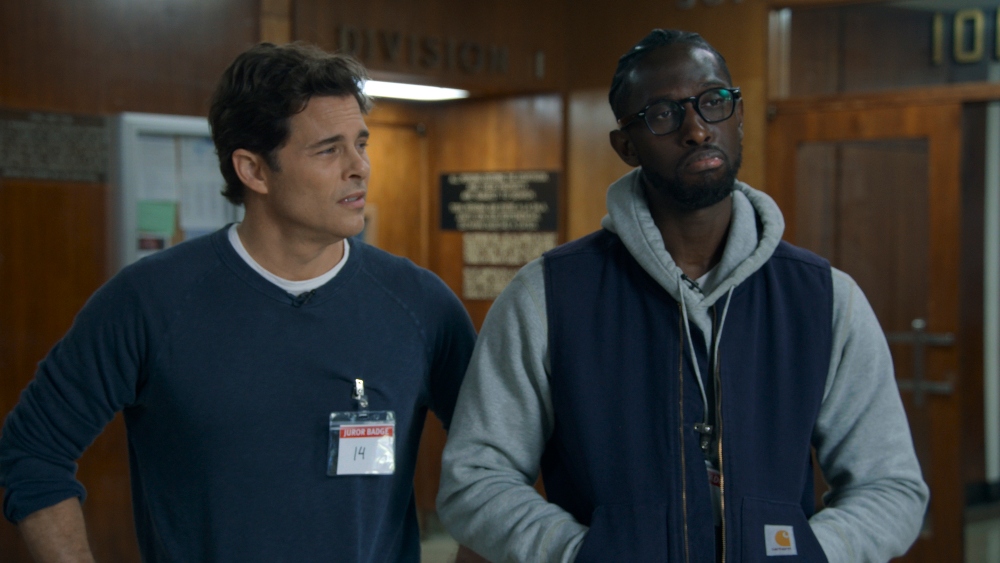
ATL: I have to say that Ronald is a pretty good actor himself, especially under James Marsden’s direction when he was doing the audition tape with him in the hotel room.
Hatton: They really were in that room for a long time. We cut it down, too. I think the whole sequence is, like, seven minutes, maybe, in the show, but they were in there for hours and they changed locations mainly because of the poop and the smell [in the scene]. But he would go and go, and you know what? He did it in such good faith. He never did the thing of being like, “Oh, you’re a weirdo actor. What is this process?” He accepted him at face value, knew that this was a friend who needed some help, and wholeheartedly engaged with that help. He did a good job. For myself, if there’s an evening when I’m bored, I’ll recite lines from [the fictitious script] Lone Pine, and I’ll think about the line, “Oh, I’ve got wounds,” and I’ll repeat that to myself for minutes at a time. [laughs]
ATL: I think the writer has something against Pacific Rim because there’s a line where a witness says he was masturbating while watching the trailer. On that note, were you ever worried about being too outrageous?
Hatton: We’re fans of Pacific Rim. I think, specifically, that was Andrew Weinberg, one of the EPs, and one of his jokes. That was one of those moments where we’re like, “Let’s just take a swing and see what happens.” Because it’s in the confines of a courtroom, there is a legal sanctity to that space, which we as a population believe means anything that happens in that room is real, severe, and truthful.
So, when you do something very silly like that, that sort of short circuits your brain in a certain way. You’re like, “Oh, he must be telling the truth that he masturbated at the Grove whilst watching a trailer for Pacific Rim: Uprising!” That was a lot of fun, that we were able to slip these truly insane moments into this very sort of austere court environment. We got some good jokes out of it. We got some laughs out of it.
ATL: Would you agree that a lot of what happened from Ronald’s perspective is a bit of luck? What if Ronald did not stand up for James and instead threw him under the bus? It would’ve been an entirely different outcome…
Hatton: [laughs] I’d like to say that I’m really, really good, but I’m not. It’s luck. Luck really carried us through. I think when you are doing something like this, the only way you can really do it truthfully is to plan, plan, plan, and think about every single contingency that your brain can possibly muster. You have to have an answer for every possible thing that could come up and then just hope for the best, and the hoping-for-the-best bit carries most of the weight. Yeah, we were tremendously lucky.
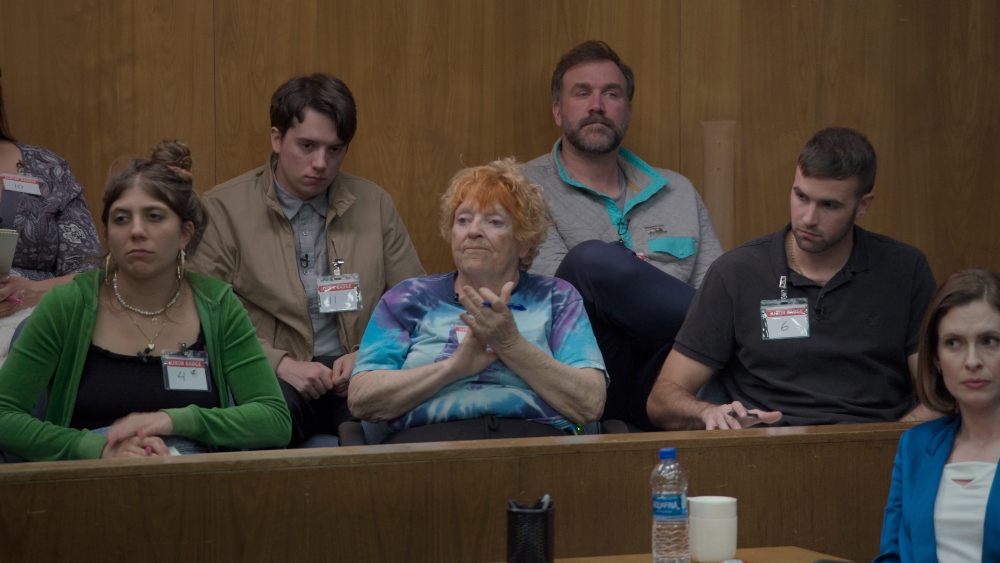
ATL: I think you’re lucky that nobody got COVID. There are behind-the-scenes shots where the crew are all wearing masks.
Hatton: You know, this is a thing that I haven’t talked about in any interviews yet, and it’s something I think about a lot from a production standpoint. None of our cast members or jurors got COVID, and we were shooting just after Omicron, which had a tremendous spread among vaccinated people. Everyone is wearing masks.
If one of our jurors got COVID on, let’s say, the third day of the trial, like Noah, the slightly conservative kid who says “I’m not a racist” and has this whole romantic storyline ending, if he’d gotten COVID on Day 3 because of protocols, he would’ve been removed for the next 10 days or so, and our entire shoot was three weeks long.
We would’ve lost an entire character because, within the legal system, we can’t just pause and say, “Hey guys, sorry, we’re going to take a break in shooting.” This is a court case that has to go on. We can’t sub in another actor either because you’ve been sequestered, so there is a degree of legal sanctity to this that we have to uphold. So, we were completely at the mercy of the COVID gods. That’s an example of how lucky we were, and that would’ve changed everything.
ATL: Were you pleased overall with the performances of the ensemble cast?
Hatton: Everyone has to realize, there are no “takes.” There’s no resetting, going again, and seeing what else we can do. It is live theater, and if anyone makes a mistake, the whole production collapses, and you don’t have a TV show. So, within the nature of the work, the stakes could not be higher. The fact that James and the rest of our ensemble, as well, were so pitch-perfect throughout and were able to find their times to hit great jokes but also show tremendous empathy and love towards Ronald… I have so much respect for them, and I think it’s truly amazing work.
ATL: What is it about you that is so good at the ruse? You did it brilliantly with Sacha Baron Cohen in the Borat sequel and you’re doing it here again. What attracts you to that sort of wacky “gotcha!” formula?
Hatton: I never in a million years thought I’d be doing this. I never thought that my specialty would be this elaborate sort of fake world. I think when it hits, the highs are higher than anything else you can do in this job, and the lows are very low as well. So when you’re doing something that has incredibly high stakes and a low chance of pulling it off, when you do get that magical moment, it’s so satisfying.
I’ll never forget Who Is America? on Showtime. There is a scene with Judge Roy Moore. For anyone who doesn’t know, he was a former senator of the State of Alabama who had a thing for going to shopping malls in the ’70s and ’80s and hitting on underage teenage girls. He has had quite a checkered political life, this gentleman, and Sasha’s character, Erran Morad, sits in a hotel suite with him in DC to ostensibly congratulate him on his political work through the last few decades and show him that Israeli inventions are really great as well. He wants to show him an Israeli invention, and he does — a pedophile detector, and lo and behold, the pedophile detector goes off when it’s near Roy Moore!
In rehearsals, it would not work. It kept failing. Probably, almost definitely, my fault, and that was extremely terrifying. And again, you can’t say, “Stop!” You can’t pause because Judge Roy Moore is coming up in an elevator right now and he’s about to sit in this room, so you better figure it out. Otherwise, this whole thing is going to completely die. And lo and behold, it ended up working completely perfectly.
That feeling in my heart as I’m hiding in the room next to it — the relief — is like a train full of dopamine, endorphins, and everything else you could possibly combine. I think the satisfaction of really trying to pull off things that people think are impossible is just a lot of fun. It’s really nerve-wracking. It’s really, really stressful. There are a lot of ethical considerations, which honestly take up the majority of my thinking when we’re doing stuff like this. “How can you do this the right way?” But when you pull it off, then it’s a wonderful thing.
I’ll say Jury Duty is, by far and away, the most rewarding experience of my life because we really set out to make a show that can make this one person feel good about themselves and their experience, and hopefully make the audience feel exactly the same way about him as well.
Jury Duty is now streaming on Freevee as well as on Prime Video.


